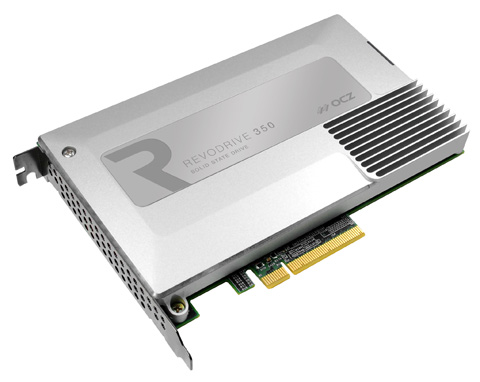
Forget SATA: the future of workstation storage is coming from PCI Express
OCZ’s RevoDrive 350 is a new workstation-class Solid State Drive (SSD) that uses the PCI Express interface instead of the bandwidth-limited SATA 3.
It slots straight into a workstation motherboard, alongside the graphics card, instead of a traditional drive bay.
OCZ claims the RevoDrive 350 will achieve three times the performance of a SATA-based SSD. This is down to the higher bandwidth PCI Express Gen. 2 x8 interface and by using up to four LSI SF-2282 processors (SATA SSDs typically use one).
To put this into figures, the RevoDrive 350 boasts up to 1.8GB/s sequential read, up to 1.7GB/s sequential write and up to 140,000 4K random write IOPS. This is compared to the typical 550MB/s sequential read/write speeds you get with SATA 3 SSDs.
But the RevoDrive 350 also stands out from other PCIe SSDs. On paper, it is even faster than the HP Z Turbo Drive (1.17GB/sec sequential read), HP’s new workstation-class PCI Express SSD that was announced earlier this month.

On paper, performance of the RevoDrive 350 is stunning but, like many SSDs, you lose out on performance as well as capacity with the entry level model
OCZ was acquired by Toshiba earlier this year so it will come as no surprise that the RevoDrive 350 features Toshiba’s own 19nm NAND flash memory.
OCZ places a big emphasis on durability claiming the new drive will support up to 50GB of host writes per day for 3 years and backs this up with a three year warranty.
It comes in three capacities: 240GB, 480GB and 960GB but, be warned – rated performance of the 240GB drive is around half that of the 480GB and 960GB models.
For an SSD of this specification prices are competitive: coming in at £436, £683 and £1,070 respectively. It’s still not cheap, but should certainly peak the interest of CAD, CAE or rendering junkies who need to throw around huge datasets at lightning speeds.






